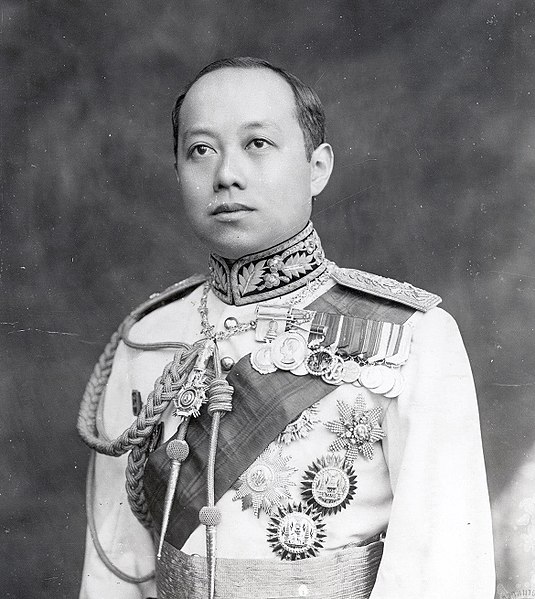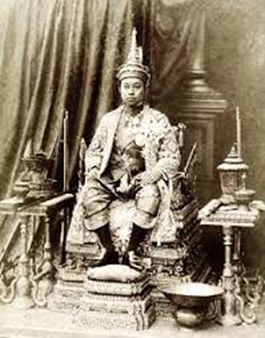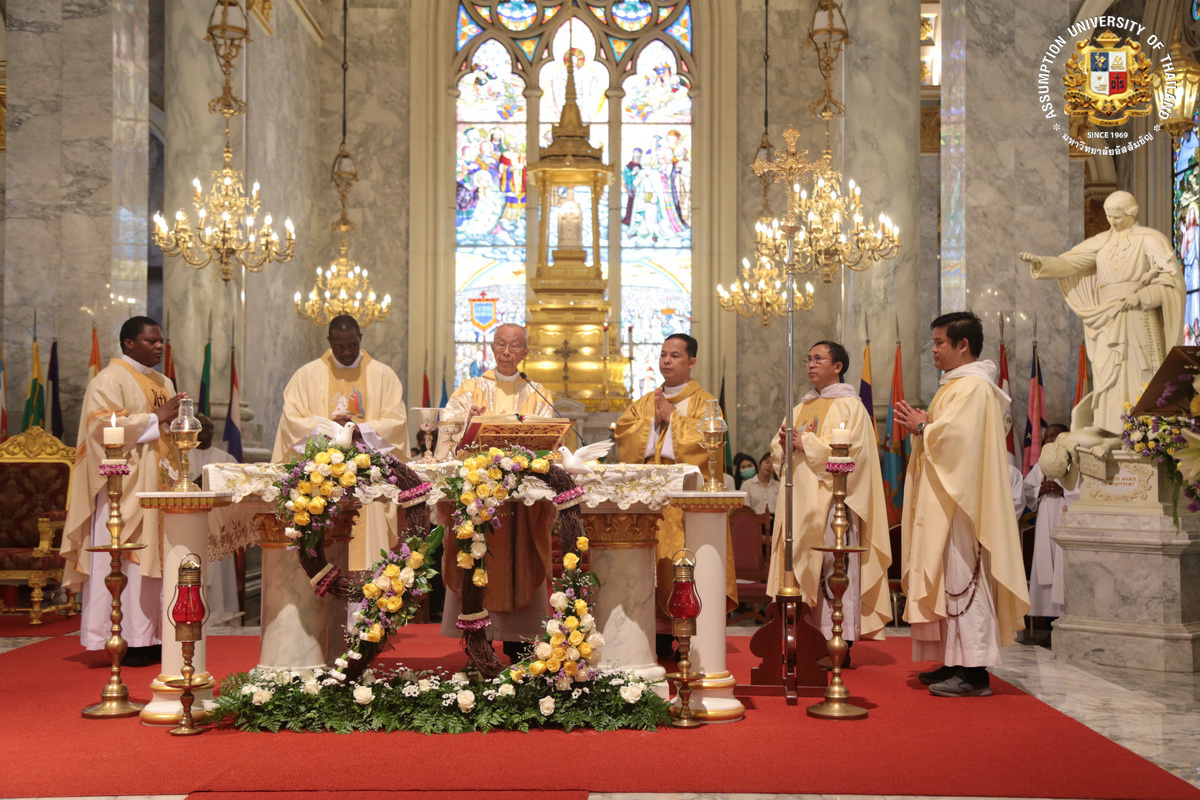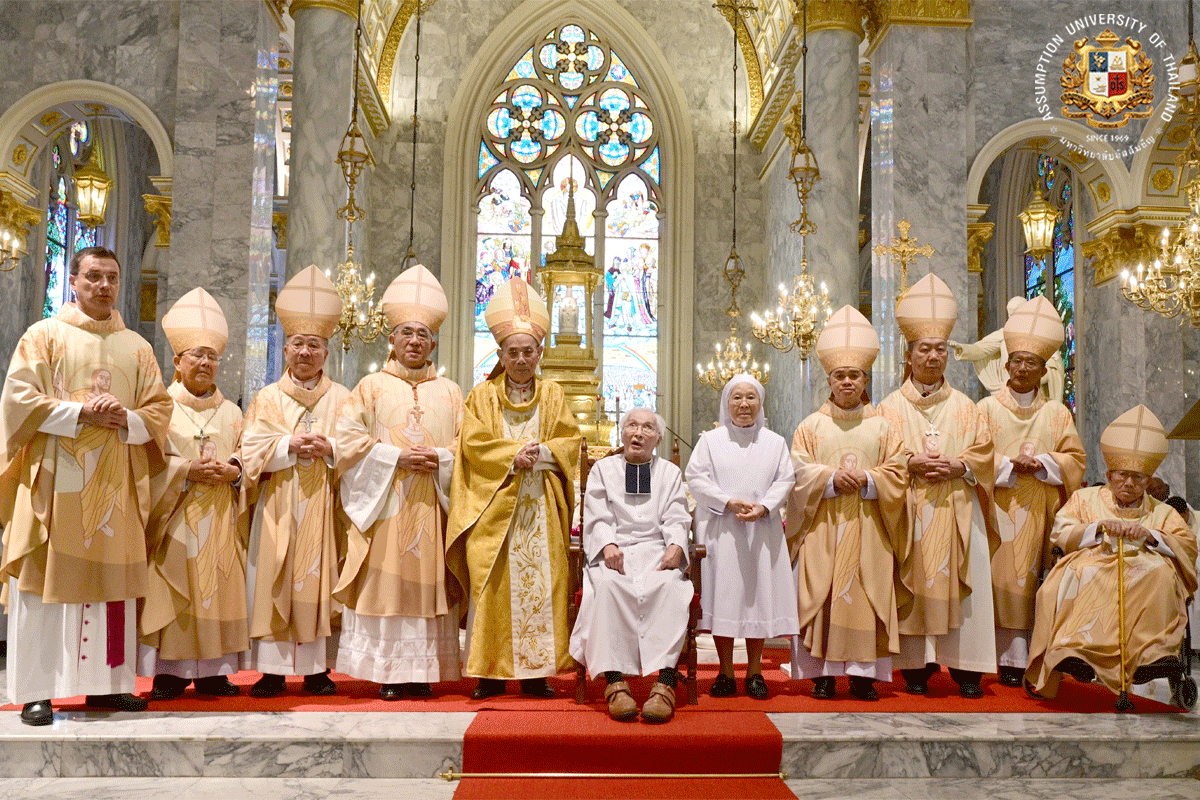 Vajiravudh, also known as King Rama VI, reigning title Phra Mongkut Klao Chao Yu Hua (Thai: วชิราวุธ; RTGS: Wachirawut; 1 January 1881 – 26 November 1925), was the sixth monarch of Siam under the Chakri dynasty, ruling from 1910 until his death in 1925. King Vajiravudh is known for his efforts to create and promote Siamese nationalism. His reign was characterized by Siam's movement further towards democracy and minimal participation in World War I.
Vajiravudh, also known as King Rama VI, reigning title Phra Mongkut Klao Chao Yu Hua (Thai: วชิราวุธ; RTGS: Wachirawut; 1 January 1881 – 26 November 1925), was the sixth monarch of Siam under the Chakri dynasty, ruling from 1910 until his death in 1925. King Vajiravudh is known for his efforts to create and promote Siamese nationalism. His reign was characterized by Siam's movement further towards democracy and minimal participation in World War I.
King Rama Vl was the son of King Rama V and Queen Saowabha, was born on 1st January 1881, his name was Prince Maha Vajiravudh. During his childhood, he studied Thai with Phraya Visuth Suriyasak as his teacher. He was established as Krommn Khuu Theptlrnrnravadi of the royal rank at the age of 8. In 1984, King Rama V his father sent him to study in England, and was accompanied Phraya Visuth Suriyasak as a special teacher for Thai language.
In 1894 Prince Maha Vachirunhit his elder brother, the first Crown Prince died, King Rama V established him as a new Crown Prince of Thailand. King Vajiravudh was the first Thai King who educated abroad when he was twelve, and stayed in England for nine years. He acquired a general education at the famous public school, and recieved special military training at Sandhurst and through service with several British infanty and artillery units.

In 1900 he attended Oxford University, Christ Church College, where he studied history, administration and law, his masterpiece while he was studying at Oxford University, he wrote the book of history "The War of the Polish Succession." For the Thai traditions, he did not lapse, while he was studying abroad, preceptors were occasionally sent to England to instruct him and also in Thai language, in Buddhism, in Thai culture and ethics. Be proved himself more English than the other people in Thailand.
This was the reason for the growing influence and popularity of the British in Thailand. As a result of the King's policy, Thailand entered the first world war on the allies side declared war on Germany in 1917, and sent a division of volunteers to France and after the world war, Thailand got a valuable amount of German shipping fell into the property of Thai navy. During his reign, Thailand had increasingly Western civilization, Western customs had profited from Western knowledge and technology. The social reform in his reign had been included as follows
- Law, the King established the Department of Draft Bill in 1923, and recodification of the Civil Code. The school of Law, which was established in the reign of King Rama V. The King commanded the school of law, and was under the administration of the Ministry of Justice, the Minister was responsible for the school of law administration, and the establishment of the Bar Association in 1904. The King promulgated a Firearms Act and the Act of the Establishment of the Association.
- Court of Justice, the King managed the regulation of the court of justice by separating the duties of the Ministry of Justice into two duties, the duty of Ministry routine work, and the duty of court of justice and Supreme court, were under administered of the Ministry of Justice.
- State Administration, the King organized the state administration, he established the Ministry of the Royal Navy, separating from Ministry of Defence, and set up the Ministry of Commerce. The King organized the status of the Department of Public Works, and became the Ministry of Communication, changing the name of the Ministry of Religous Affairs (Thammakarn) to the Ministry of Education, annexing Ministry of Metropolitan Authority to the Ministry of Interior. The King appointed the high ranking officials and someprinces as Uparajs (the King's representatives). Uparaj had duties to inspect and controlled Monthons (an official division comprising a number of provinces, it might be five, six or seven provinces), and Uparajs were directly controlled by the King, and changed the Thai word "Muang" to "Changwat", Muang and Changwat meaning a province, for example Muang Chiengmai called Changwat Chiengmai (the Province of Chiengmai), and the Civil and Commercial Code was promulgated in this reign.
Public health, the King began to build Chulalongkorn Hospital in 1911, and completed in 1914, established Pasteur Institute in 1915 for curing the disease of hydrophobia, in 1920 the King established Saowabha Institute for producing vaccines and serums, used to prevent or cure a disease obtained from the blood of an animal that had been made immune to the disease. And set up the Department of Public Health in 1918, and established the school for nurses of the Red Cross Society in 1922 and the school of medicine for military service, Vachira Hospitai (Vachira Payaban) in 1912, and opened Bangkok Water Supply Station in 1914
Education, it had been improved in accordance with western style. For instance the King founded a boarding school, Vajiravudh School which was on the line of an English public school. The standard of education in Thailand in his reign was improved and enlarged to university level, the king changed the status of the School of Civil Officials from school to university level in 1917 and called Chulalongkorn University with four faculties, Faculty of Medicine, Public Administration, Engineering, Art and Science. So Chulalongkorn University is the first University' in Thailand, was set up in the memory of King Chulalongkorn and was named after him.
Concerning the vocational education, the King aimed to train Thai students to have an experience in many kinds of profession for their future occupations. The King held an exhibition of the Students Art and Craft in 1912. Later the King established the School of Art and Craft in 1913, the Woman Teacher Training College (Benchama Rajalai School) in the same year, the School of Commerce in 1912, the Elementary School of Agriculture in 1917
The educational system had been developed further in this reign, some people set up private schools for Thai students and for the purpose of well organization of the private school, the King promulgated the Private School Act in 1918. In order to avoid the people's illiteracy and encouraging them to be the people who were able to read and write, the Law of Elementary Education was promulgated in 1921, and was made compulsory for Thai people all over country.
In addition the King gave attention to the education in the rural area, and set up the elementary school in the rural area (the Prachaban School), and the schools were under the administration of the Ministry of Education. The Prachaban school was subsidized by educational tax (an extra money called Suksa Plee contributed by the people for the Prachaban school).
The King had a policy in social reform by building schools instead of building temples. In a general way, the King supported a national education, and assisted private schools, so at that time there were many schools in Thailand were under the patronage of the King.
Improvement of Railroads and Air Ports
In the reign of King Rama V, the railroads had been constructed, and was continually carried on in this reign. The King commanded to combine two railway authorities of northern and southern lines into one authority and called "Royal State Railway of Thailand", the King appointed Prince Kampangpetch as Commander of Royal State Railway, Prince Kampangpetch enlarged the railroad to every line. The eastern line extended from Chachoengsao to Aranyaprathet. The north-eastern line proceeded from Nakhon Rajsima to Ubon Ratchathani, and another line from Nakhon Rajsima to Khon Kaen, and finally proceeded to Nong Khai. The southern line to Padang Besar station, between a border of Thailand and Malaysia.
The northern line in the reign of King Rama V, the railroad construction was accomplished to Uttaradit Station. In this reign the construction extending to Khun Tan Hill in the northern part of Thailand. Finally the Khun Tan Hill was bored as a hollow space in the pattern of railway tunnel, . the Royal State Railway Authority continually constructed a railroad from Khun Tan Station to Chiengmai, and this railroad line was opened in 1922 by the express started from Bangkok to Chiengmai.
The construction of a railway bridge across Chao Phraya River was carried on in this reign, for the purpose of connection of south line and north line, and completed in 1922 and was named "H.ama VI Bridge"
Don Muang or Bangkok Air Port was constructed in this reign for the purpose of an airplane starting and landing and for an air liner carrying passengers to Thailand, and from Thailand to foreign countries.
For broadcasting, or sending out by radio, the King set up two radio stations at Saladang Location in Bangkok, and another one in Songkhla in the south of Thailand, all radio activities was commanded by an efficiency and a great effort of Prince Kampangpetch. And the1 broadcasting system has been gradually developed to the present day.
Improvement in Social Activities
- The King commanded to use Buddhist Era (B.E.) for calling Thai official year instead of R.S., R.S. or Ratanakosin Sok, meaning the Era dating from the founding of the city of Ratanakosin (Bangkok), the old ·system of calling the official yea. r .as R.S. was abolished in this reign and began to use B.E. in 1913 or B.E. 2456 (for example A.D. 1982 the same to B.E. 2525)
- The King issued the Law of Surname, that resulted Thai people having name, for first name, with surname or family name. That will be encouraged the people who have family name, he would behave himself as a good citizen that for the fame of his family name.
- The King issued a Royal Decree in 1921, as the "King's Order for the use of word of the beginning of the name of the people as follows
(1) People or commoner must have first name and surname, for example Mr Snit (first name) Sombunvej (surname), we cannot use the name only Nai Snit or Mr Snit.
(2) Young Woman beginning with Nang Sao (Miss) or N.S. for example Nang Sao Dara (first name) Sombunvej (surname) or Miss Dara Sombunvej
(3) Married woman beginning with Nang (Mrs), for example Nang Sao Dara Sombunvej married, and Pongthep was the surname of her husband, so she changed her name from N.S. Dara Sombunvej to Nang Dara Pongthep.
(4) Girl beginning with Dek Ying (female child) or D.Y.
(5) Boy beginning with Dek Chai (male child ) or D.ch. - The King advised the people to call time in the form of universality, 60 seconds make a minute, 60 minutes make an hour, 24 hours make a day, A.M. before noon the time from midnight to noon, P.M. afternoon the time from noon to midnight. At a previous time in Thailand, telling time, and what time it is by calling Tum, Mong and Yam, for example the time of 8 P.M., we called Song Tum (means two o'clock at night) or 8 A.M. we called Song Mong (meaning two o'clock in the morning.)
- The King promulgated the Law on succession of 1924, it had an important meaning that succession to the throne presumptively to the line of Queen's son.
- King advised women in Grand Palace dressing themselves in the pattern of western dresses since 1920, and this action caused women outside Grand Palace, followed King's advice. It was the great change of woman dresses in Thailand to western style
- In 1917, there was an official notification about the "National Flag" or Three colour flag or Trirong flag (red, white, blue). This design of national flag is still used to the present.
- Dusit Dhani, the city of model of democracy. The King established Dusit Dhani in Dusit Royal Palace as the city of democracy, he tried to introduce all democratic systems to Dusit Thani, the people in Dusit Thani formed a government elected by the people who lived in the Palace.
- The King established Boy Scout Movement for boys to develop manliness and usefulness to the other. They wore uniform and were trained outdoor habit, self reliance discipline and public spirit.
Wild Tiger Scout Movement
One of the important activities in this reign, was the King's foundation of the "Wild Tiger Scout Movement" to fortify himself against possible dangers. At first the "Wild Tiger Scout Movement" consisted only of officials and other intimates of the monarch. The operation of the Movement was such that it aroused the hostility of the army and navy.
Abolition of Extra Territorial Rights
After the first world-war, in 1919 Thailand became a member' of the League of Nations, and the King attempted to negotiate with many countries to abolish extra territorial rights In 1922 America abandoned extra territorial rights as a result of this diplomacy, and of Thailand's greater recognition on the international scene. The encouragement of international relations between Thailand and other countries, had been the work of the most powerful man in his reign, he was Prince Dewawonge the King's uncle, who performed official services for thirty years as Minister of Foreign Affairs during his career. This period was called as the period of the Treaties of Liberation.
Rebellion
Another historical event in this reign, it was an unrest occurrence, the rebels planned, and would fight against the King in 1912. A group of the rebels who tried to resist and fight against the King and the government authority, the rebel party in tended to seize political power from the King on the occasion of ceremony of taking an oath of loyalty to the King which held in the Temple of the Emerald Buddha. The rebel party planned to report the King by the chief of rebel (Captain Khun Teoyhan Pitak), while the King was sitting in the temple of ceremony.
According to the rebellion plans the chief of rebel would request the King to change his status from King of Absolute Monarchy regime to King of Democracy or King under constitution, if the King did not agree as the proposal of the rebel party, the rebel party would take action to seize power of King's government, but the ' rebels could not carry out, because one of the military officers who was Luang Sinad Yotharak, the Commander-in-chief of Thai army at the Province of Pisanuloke, informed the King about the plan of rebellion.
Finally the rebels were arrested on 27th February 1911, and the judge sentenced them to imprisonment and some to death penalty. Later the King showed his kindness, the King pardoned to the persons who were put to death by issuing the Royal Decree of Pardon.
In 1924, the King held special festivities commemorating the end of fifteenth year of his reign, he promulgated the Royal Decree of Pardon, all political prisoners were released from the prison, they felt satisfaction to the royal kindness of King Rama VI.
Play, Literature and Poets
Literature and Poet, in the reign of King Vajiravudh, it is the period of new development in Thai literature and the renascence of a modern Thai literature, the King himself is a famous writer in various aspects, he wrote books as follows
The more importance than any of his books are the literary survivals. The patriotic plays "Huachai Nakrop" (the warrior's spirit), and Phra Ruang (the Monarch of Sukhothai Kingdom).
The plays bad been often performed in the reign of King Rama VI and later in special occasion.
The King composed the song of Sayammanusti (The realization of Thai people) is one of Siam's best known patriotic songs, that r elates an event in Thai history, Thai people struggle for survival of independence.
Thai people sing the Song of Sayammanusti with a musical composition for urging on patriotism as follows,
Sayammanusti Song
If Siam is still in existence, we are still alive. If Siam has been completely destroyed, how can we live. it is likely, Thai nation has come to an end.
The King's nationalistic publications emphasizing on patriotic spirit that inspired Thai people of new generation, becoming a nationalist.
The famous books concerning the patriotic spirit are the books ''Awakening of Thai people" and "Reminiscence of Wild Tiger" King Vajiravudh thought that it might be some people in Thailand would not understand his patriotic policy. Once he said "When I die, it will be for many years before those who come after me, will realize what I have done the goodness to my country." His books concerning history and literature are "The Story of Origin Ramayana", "Muang Phra Ruang Tour" or "Sukhothai Tour", "Egyptian Cities Tour". The books of literature concern a drama, to be performed on the stage of a theatre are "The warrior's spirit" "Injury and safety by thorn", and "Sacrifice" Books of instruction in particular subjects of study as text - books, they are "The Enlightenment of Lord Buddha" "Marine Laws'', "Prevention of Illness".
King's Pen Name.
The King has a lot of pen names, but for his popular pen names are,
- Rama Chitti
- Pun Liam
- Sri Ayuthaya
- Ussawaphahu
- Nai Keo Nai Kwan
- Noila
- Phrakhun Petch
- Others
The other poets in his reign they are as follows with the books of their masterpieces
- Prince Rurhni Cham Chumrus (Krommameun Pitayalongkorn), his books, "The letter of Changwang Lum", "Succession", "Money Markets", "Tale of Vetal", "Kanok Nakhon", "Sama Krung'
- Chao Phraya Thammasak Montri (his pen name Kru Thep ), his books ''Text book of Ethics'', "Treatise of Education and Economics", "Kruthep Poetry"
- Phraya Srisunthorn Vohan (his original name Phun Sarak), his book "llraj Poetry"
- Phraya Uppakit Silapasan, his books, "Narration of Some Poetries" "Four Text-books of Thai Grammar'', they are books "Akkara Vithi'', "Vachi Vipak" "Vakaya Samphan", "Chanthalux"
- Nai Chit Burathat, his book "Poem of Non-Unity Story"
- Chao Phraya Phra-Sadet, his books "A good citizen'', "A Noble Behaviour", "Doctor's Ethics", "A Short History"
- Phraya Surin Raja (his pen name Mae Won), his book "Evil for Evil"
The King passed away.
The political situation in his reign, the depression occurred during the last year of his reign, and was downward taken by economy, poor rice harvest, budget deficit, and growing criticism of administration authorities could not help them, but affected the power and responsibility of the King.
The King was on the throne 16 years, he had suffered from periodic illness during his reign, and his final illness began in August 1925, caused on an infection of the intestinal trouble and he died on 25 the November 1925, at the age of 45
King Vajiravudh had of course hope for a son of his own to succeed on the throne, but his child was born two days before the King's own death, and turned out to be a girl. and therefore by the King's law on succession
1924, not eligible to succeed. On the birthday of his child, the King's question, when the baby was brought to him and placed by his side, the King asked "Is it a girl or a boy", the answer was "a girl". The King stopped for a moment then said "It is just the same", and the new horn child was named Princess Petchrat Rajsuda Sirisobba Punnawadi, Phra Vorarajthevi (Somdej Phranangchao Suwattana) as her mother.
King Rama VI - The nationalist King and a writer of great talent.
Sources
Bhamorabutr, A. (1983). The Chakri dynasty. D.K. Today.
Vajiravudh. (n.d.). https://en.wikipedia.org/wiki/Vajiravudh



